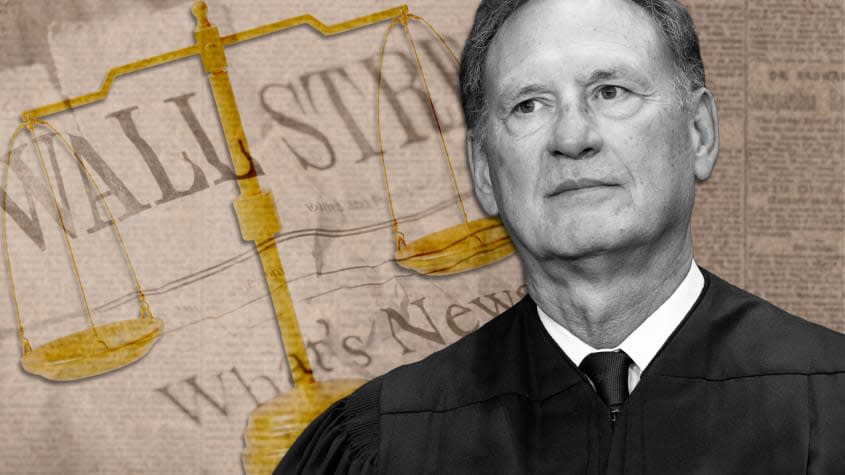Was Samuel Alito's Wall Street Journal 'prebuttal' a journalistic ethics lapse?

- Oops!Something went wrong.Please try again later.
- Oops!Something went wrong.Please try again later.
For the second time this year, a conservative Supreme Court Justice finds themself amid a growing controversy over their relationship with, and acceptance of gifts from, a billionaire donor who would then go on to have business before the high court. After an extensive series of reports detailing Justice Clarence Thomas' conspicuously beneficial relationship with billionaire Harlan Crow, investigative news outlet ProPublica this week published a similarly themed expose on Justice Samuel Alito, who allegedly received similarly lavish gifts from major GOP donor Paul Singer. Like Thomas and Crow, Alito did not include the gift — a 2008 private jet flight to Alaska followed by a stay in a $1,000 per night luxury cabin — in his various financial disclosure forms, nor did he recuse himself when Singer's hedge fund, NML Capital, appeared before the court several years later.
Hours before ProPublica published its investigation into Alito and Singer's relationship, the justice took the unusual step of "prebutting" the not-yet-public allegations in a lengthy Wall Street Journal essay titled "ProPublica Misleads Its Readers." Prefaced by a wry editor's note that described the Emmy, Peabody and Pulitzer award-winning ProPublica as an outlet that "styles itself an independent, nonprofit newsroom that produces investigative journalism with moral force," Alito's essay offers a series of excuses and explanations for not recusing himself and for failing to report the Alaska trip, asserting that faced with allegations of impropriety, "neither charge is valid." Regardless, Alito's choice to use the Journal to respond to the questions posed to him by ProPublica throughout their reporting has received considerable pushback, not only against Alito for his specific legal interpretations but also against the national outlet that published his essay in the first place.
A "terrible look" for The Wall Street Journal
Alito's choice not to respond to ProPublica's questions directly but instead publish a preemptive rebuttal in a competing outlet was "pretty rinky-dink," Society of Professional Journalists Ethics Committee Vice Chair Chris Roberts told The Washington Post. Committee Chair Fred Brown agreed, calling it an "affront" that could have avoided "a lot of justifiable criticism" and reader confusion if the Journal had simply waited to publish Alito's essay until after ProPublica's report had gone live.
"This is a terrible look" for the Journal, former employee and current New York Times reporter John Carreyrou tweeted, speculating that the Journal itself wouldn't be thrilled "when another news organization front-runs a sensitive story it's working on with a preemptive comment from the story subject."
Former New York Times public editor Margaret Sullivan invoked Carreyrou in her condemnation of the Journal's decision. "What if, say, The Washington Post's editorial board had allowed Elizabeth Holmes to preempt John Carreyrou's investigation for The Wall Street Journal that exposed the fraudulent practices of her blood-testing company, Theranos," she wrote in a column for The Guardian that accused the Journal of lacking "even a basic level of journalistic solidarity" with its competitors. Even Fox News media columnist Howard Kurtz took a swing at his fellow Rupert Murdoch-owned outlet, asking whether the Journal's decision was "really fair."
Calling it a "gambit," Sen. Sheldon Whitehouse (D-RI) tweeted interest in knowing the "backstory" to how Alito's pitch to the Journal had been "cooked up" in the first place.
"We're happy to get a response in any form," ProPublica Editor-in-Chief Stephen Engelberg told The New York Times, saying he was "surprised" to see Alito's essay. "We're curious to know whether the Journal fact-checked the essay before publication," he added, pushing back on the piece's declarative title in particular. ProPublica reporter Justin Elliott was similarly upbeat about Alito's response to his story, even if it came in the form of a Wall Street Journal essay, telling The Washington Post, "We're happy to get substantive engagement with our questions in any forum."
"We are defending the Court because someone has to"
The Journal, for its part, has been defiant in the face of the growing chorus of criticism over Alito's prebuttal, writing in a fiery letter from the editorial board that it's "hilarious to be denounced for betraying the media brotherhood" simply because they scooped "the competition."
"We saw ProPublica's list of 18 questions and had a good idea of where the reporters were going," the letter noted, seemingly admitting that the Journal knew full well that Alito's essay would be an overt rejection of ProPublica's request for comment. "The story proved us right." Instead, the Journal's editors claim, the entire controversy is simply cover for the "left's fury at having lost control of the court." As such, the editors echo far-right National Review columnist Dan McLaughlin, who attacked ProPublica's report as part of a larger, coordinated push by "progressives" who "can't get the results they like" and instead "do whatever it takes to burn down the institution's public legitimacy."
Admitting that Alito had taken an "unorthodox step" in preempting ProPublica's story with his opinion essay, conservative constitutional law professor Josh Blackman defended both the justice and the Journal, writing that the move was justified since "ProPublica has proven itself unreliable" in its reporting. "Justice Alito shouldn't have to do the media's job," Blackman said. "Fortunately for the Supreme Court, he did so."
You may also like
Problematic Ford Explorer recall prompts federal investigation
James Cameron says Titan submersible was 'critically flawed'
Arizona governor bars county attorney generals from prosecuting abortion cases

